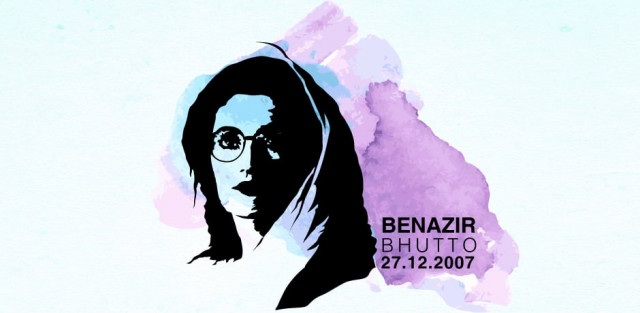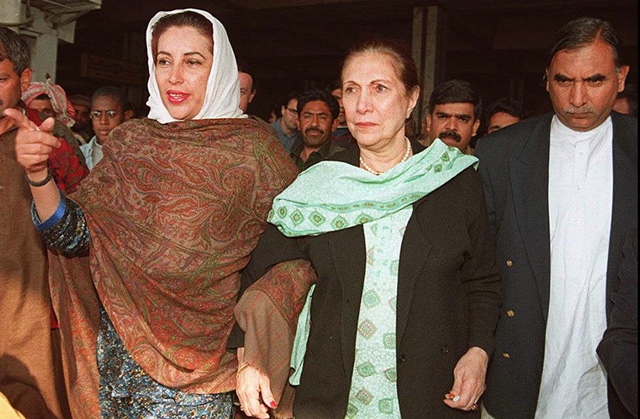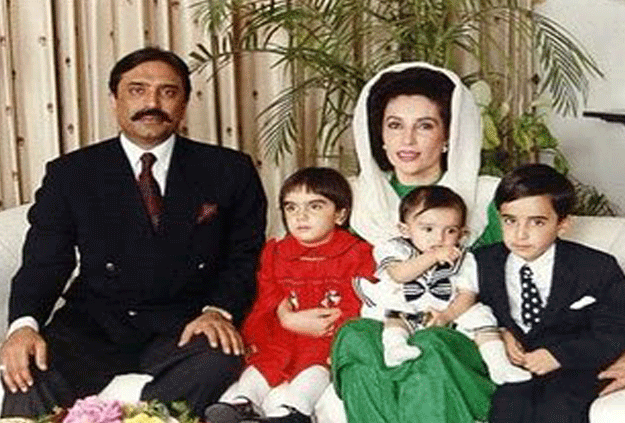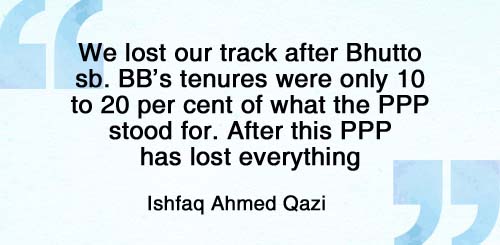PPP loses the Bhutto touch
Jiyalas say give and take has overshadowed PPP’s own aggressive style of politics

Her tragic assassination was a great loss to the PPP and Pakistan alike. In her assassination, the country lost a courageous and moderate leader, while the PPP was dealt a huge blow, as the vacuum created by her departure is yet to be filled in.
Bhutto was assassinated in a gun-and-bomb attack in the afternoon of December 27, 2007, while she was leaving Liaquat Bagh, Rawalpnidi, after addressing an election rally. Although Bilawal Bhutto Zardari, her son, succeeded her as the party chief, yet 10 years after her death, it is her widower, Asif Ali Zardari, who is actually calling the shots in the party.

Bhutto’s political career spanned over some 30 years. She bravely struggled against dictatorship. She was deeply connected with her Jiyalas (the party workers) of all cadres – the element that is missing in the party after her death.
Before the advent of emails, she used to write replies to letters of the workers. In her last days, she was keen to use modern technology and communicated with them through emails and other means to stay in touch with them.
Dr Adeel Malik, Associate Professor at the Oxford University in UK, recalls his interaction with Benazir Bhutto back in 2005, when she turned up at a coffee shop to interact with the students during her exile.
Dr Malik, a student then, found her ‘very engaging’. “She had a lot of curiosity and wanted to know from us, the Pakistani students, about Pakistan. She wanted to know what people over there think,” he said in a telephonic conversation. After this interaction, she remained in contact with these students through email, he added.

Bhutto Zardari, on a number of occasions, made attempts to reach out to the party workers but could not bring any tangible impact because his security protocols, in the wake of real or perceived threats, hampered these efforts.
This is contrary to Benzair Bhutto. She defied security protocols and threats to reach out to the people. The greatest example of it was her return to Pakistan in October 2007 -- in defiance of warnings from then president and army chief General (now retired) Pervez Musharraf as well as some international interlocutors. Her daring move cost her life.
A senior PPP leader summed up the 10-year period without Bhutto as a decade of political compromises. “We have seen [Zardari’s] friends taking over from workers in these 10 years. Politics of give and take has overshadowed our own natural aggressive style of politics,” he told The Express Tribune.

He cited the recent example of the PPP’s withdrawal, at the last minute, from its stance of accountability for all by agreeing to exclude military officers and judges from the proposed bill on national accountability commission.
The accountability of all was part of the Charter of Democracy, the PPP had signed with the Pakistan Muslim League-Nawaz (PML-N) back in 2006. A senior PPP leader, who was member of the parliamentary panel working on the draft law, resigned from the committee silently, in protest.
PPP’s old guards still remember how much importance the top leadership of the party used to give to its workers during Zulfikar Ali Bhutto’s time. Benazir Bhutto just followed in her father’s footsteps.

“We had at least one party worker in every street of the city. We used to get feedback from these workers in our fortnightly meeting of wards. The wards used to convey in written this feedback on different issues of public importance -- negative or positive -- to the city chapter. The city chapters then sent it to the Prime Minister’s House directly for action,” Ishfaq Ahmed Qazi, a diehard PPP worker from Rawalpindi, explained how they used to work in the 1970s.
Qazi, who braved torture and jails, including 21 months of solitary confinement at Kot Lakhpat jail and four months in Lal Qilla during General Ziaul Haq’s regime, is an eyewitness to many occasions when Bhutto and other senior leaders of the party stood for the working class.
“We lost our track after Bhutto sb. BB’s tenures were only 10 to 20 per cent of what the PPP stood for. After this PPP has lost everything… Isn’t it sad that female teachers are protesting for the past one week in Karachi and the provincial government is oblivious to their grievances,” Qazi said.
Qazi has been running a free technical training centre for the poor since 1976. Hundreds of people have been trained at his centre. The PPP lost its selfless workers like Qazi when it preferred affluent class over the poor workers. Most such ideologues have passed away, some were sidelined and many left the party dejected.
For the people like Qazi, the PPP was the party which genuinely stood for rights of peasants, workers and the labours. The party that once promised the elimination of feudalism to further the interests of peasantry, now banks on candidates from the feudal background, especially in Sindh. The party that relied on its workers now relies on electable for its survival. It lost its vote bank to politics that revolves around personal interests of leaders.



















COMMENTS
Comments are moderated and generally will be posted if they are on-topic and not abusive.
For more information, please see our Comments FAQ